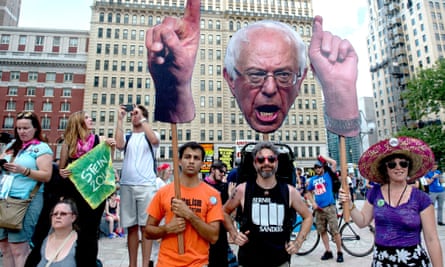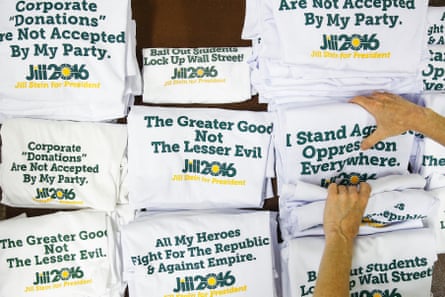At times during the Green party convention it was hard to tell whether the more dominant emotion was enthusiasm for Jill Stein or dislike of Hillary Clinton.
As Stein took the stage on Saturday, a chant rang out from party members that encompassed both positions. “Jill not Hill! Jill not Hill!” they sang as she made a brief speech before her nomination as the presidential candidate was formally confirmed.
The Green party’s fervent hope is that “Jill Not Hill” will be a worthy successor to another catchy three-word phrase often heard on the left over the past year: “Feel the Bern”. Some in the room had gravitated to the Greens after Bernie Sanders lost the Democratic nomination to Clinton and, to the dismay of many of his supporters, endorsed her.
“I want to recognize the people coming out of the Bernie Sanders campaign who launched a political movement and refused to let that movement die in the Democratic party,” Stein said, to cheers.
“You have completely changed the political dynamics going forward, it will never be the same and there will be no stopping you, there will be no stopping us until we have achieved that change that we have all put on the platform together.”
Speaking at a podium in front of pots of sunflowers, Stein added: “This really is that moment that I think so many of us have dedicated our lives to creating and that we never thought we would see happen in our lifetimes.”
That moment, she told the Guardian afterward, is an opportunity for political transformation born of disillusionment with the two main parties amid costly, expanding and futile wars, a rapidly changing climate and young people trapped by student loan debt.
“Politics as we know it is melting down in front of our very eyes, voters are in revolt, are rejecting the Democratic and Republican candidates at record numbers,” she said. “Hillary and Donald [Trump] are the most disliked and untrusted candidates for president in US history and even their supporters don’t really support them, they just don’t like the other candidate. People are clamoring for more choices. We are that other choice.”
When the Republican party hosted a debate at the University of Houston in February, a vast security and media presence seemed to put half the campus on lockdown. In contrast, the Green convention was barely visible to passers-by in the student building where it took place, let alone the wider world.
The party, though, is hoping for a major boost from Sanders followers who refuse to heed his call to back Clinton in November. A spokesman said the attendance of roughly 500 was the biggest in the party’s history, with about half having registered in the past month, in the wake of Sanders’ decision to endorse Clinton.

Despite a relative lack of exposure in the mainstream media – though a CNN Town Hall broadcast with Stein is scheduled for 17 August – Stein believes the Greens can use social media and the internet to push their message to a wider audience.
The slogan on her Twitter feed is a direct repudiation of Democratic arguments that failing to vote for Clinton would help Trump: “Time To Reject The Lesser Evil For The Greater Good”.
“I know you’ve had it with the corrupt and unfair Democratic party,” Kent Mesplay, a candidate for the Green nomination, told Sanders fans to cheers inside the convention hall. “The leader of your revolution has sold you out to a corporate shill and warmonger. So what are you to do? Be Green!”
Still, despite Stein’s popularity, the Green party is not without internal anti-establishment sentiment. In a press conference for presidential candidates on Saturday one of them, Sedinam Kinamo Christin Moyowasifza-Curry, an African American woman from Los Angeles, said this was a “contested convention … you will see us disrupt it – peace and love!”
Her chief complaint was that Stein, as a Harvard-educated, 66-year-old physician, is representative of white privilege in a party dominated by people of European heritage, rather than the youthful diversity of the US.
Another candidate, Elijah Manley, an African American 17-year-old from Florida who decided to run more than a year ago, said he wanted to shift the Greens from being “a party that has white privilege, a party that has adult privilege”. He said his first acts in the White House will be to abolish the Federal Reserve, pardon Edward Snowden and lower the voting age to 16.
“I love Dr Stein,” he said, “I do, but it is not time to sell out.” It was certainly not time to back the Democratic candidate. “Hillary is a lot more scary than Donald Trump,” he said, arguing that Trump is an unknown quantity who would probably be ineffective, while Clinton “is an insider to everything. She’s a neo-liberal disaster. She is a war hawk who would start world war three”.
The biggest applause of the morning was reserved for the appearance via video of WikiLeaks founder Julian Assange, to discuss the leaking of thousands of emails on the eve of last month’s Democratic national convention which indicated some senior Democratic National Committee members had been biased against Sanders’ candidacy.
“The [Jeremy] Corbyn phenomenon in the UK really does show that something very important is happening, there is a political moment in the English-speaking world that the Greens should [seize] and are,” he said.
Assange has said more Clinton-related material is on the way. “What’s the smoking gun?” someone shouted in the theatre. “The big email?” another yelled, as, live from the Ecuadorian embassy in London on a rather perfidious video feed, Assange urged the room not to be pressured into voting for one mainstream candidate because of the fear of another.
“That’s a form of extortion,” he said.

The Greens’ most realistic aims are qualifying for televised debates by reaching 15% in five national polls and securing 5% of the popular vote in the election, which would entitle them to potentially millions of dollars in federal funds. A lawsuit against the Commission on Presidential Debates filed by Stein and Gary Johnson, the Libertarian party candidate, failed on Friday. Stein is at 4% in a Real Clear Politics average of polls. In 2012, she took 0.36% of the popular vote.
“We’ve come up from invisible in the polls to as high as 6% and even 7% so this is a message that’s propagating itself,” she said. “The Green party’s not so different from the rest of the American public, that doesn’t like Hillary Clinton and doesn’t trust Hillary Clinton. The polls are pretty explicit about that.”
Those from farther across the political spectrum are welcome, too. Never mind Republicans for Hillary – how about the GOP for Jill? And not simply for tactical reasons, to split the left?
“There is a way in which our campaign has common cause with old-fashioned Republicanism, which was about avoiding the military-industrial complex, in the words of Eisenhower, and about old-fashioned representative democracy rather than rule by multi-national corporations.
“There are still Republicans … with political integrity that are looking for a candidate that represents their position and I think I’m the only one out there.”

Comments (…)
Sign in or create your Guardian account to join the discussion